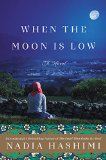Summary | Excerpt | Reading Guide | Reviews | Beyond the Book | Readalikes | Genres & Themes | Author Bio

A Novel
by Nadia Hashimi
The reference to my mother inspired KokoGul's imagination. "I asked Fereiba to go to the orchard that night. I rarely get such cravings for the mulberries, but something mysterious had come over me. My tongue began to tickle for those sweet berries. I tried to ignore it but I couldn't help myself. As if something in those trees was beckoning me, I wanted to run out there. But I was busy helping the girls with their homework so I asked Fereiba to pick a few for me. She's such a good daughter, she went off into the orchard for me. So I'm not sure who the angel was supposed to meet. Maybe that craving was his way of calling me. But I sent Fereiba-jan in my stead, so we'll never know."
The women didn't seem too impressed with KokoGul's theory, but they didn't challenge her. I entered the room, carefully balancing a tray with three hot cups of tea in one hand and carrying a bowl of sugar in the other.
"Afghan carpets were made with Fereiba-jan in mind," KokoGul announced. "Thanks to their red color, you would never know how much tea gets spilled on them." There was light laughter, and my head stayed lowered. I smiled politely as I placed a cup before each woman and offered sugar cubes. I could feel myself being scrutinized.
"Afareen, dokhtar-jan," KokoGul commended. Well done, dear daughter. I retreated to the kitchen with the empty metal tray. Today I was her daughter.
In truth, most days I was her daughter. Because I wasn't attending school, I spent a lot of time at home with KokoGul. Indeed, the weight of the household fell mostly on my shoulders, and she reprimanded me severely when things weren't done to her liking. But I was with her the most. We spent hours together preparing meals, cleaning the house, and tending to the animals. Her sharp tongue needed an audience— or a target. I loved going to the bazaar with her. Inspecting a pile of bruised tomatoes, she asked the vegetable vendor if his hefty wife had mistakenly sat on his produce. At the housewares shop, she asked if the overpriced dishware was from the king's private collection. KokoGul's wit either rubbed the wrong way or scored a chuckle and a discount.
We were allies when we bargained our way through the things we needed: the meats, the vegetables, the shoes. I mimicked KokoGul's brazen demeanor and negotiated the best price I could. She would nod approvingly. In the market and the chores, my younger sisters could not do anything as well as I did.
"Najiba, look at this," she would complain. "This shirt still turns the water brown. How can you think this is clean? Have you seen how your sister makes a good lather? How many times have I told you—you can't expect a shirt to clean itself! Thank goodness I at least have one daughter who can actually help me around the house."
These were moments when I felt connected to her, this woman who was my mother, without being my mother.
Excerpted from When the Moon Is Low by Nadia Hashimi. Copyright © 2015 by Nadia Hashimi. Excerpted by permission of William Morrow. All rights reserved. No part of this excerpt may be reproduced or reprinted without permission in writing from the publisher.




Children are not the people of tomorrow, but people today.
Click Here to find out who said this, as well as discovering other famous literary quotes!
Your guide toexceptional books
BookBrowse seeks out and recommends the best in contemporary fiction and nonfiction—books that not only engage and entertain but also deepen our understanding of ourselves and the world around us.